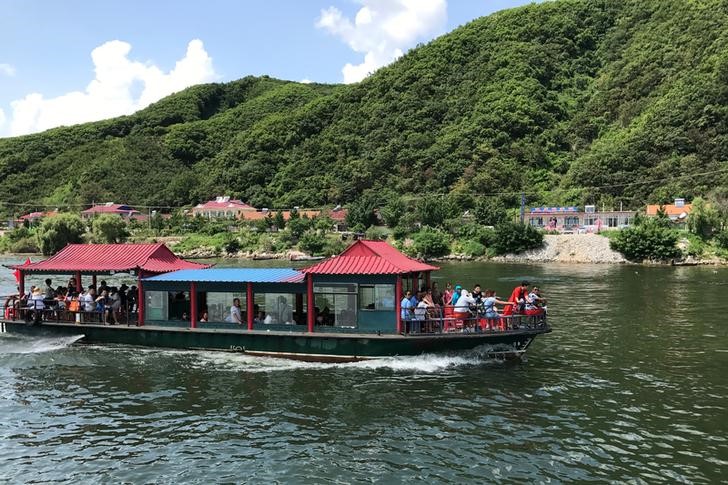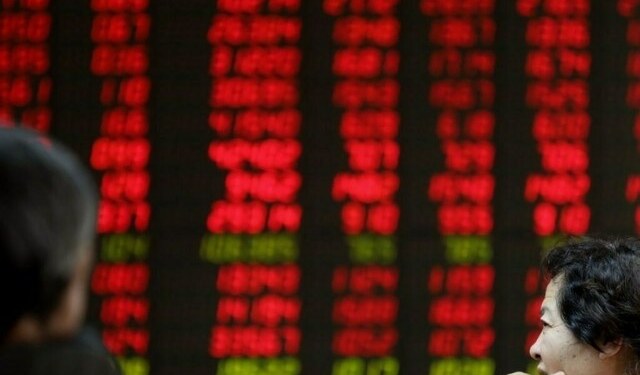 © Reuters. Chinese tourists are seen a boat taking them from the Chinese side of the Yalu River for sightseeing close to the shores of North Korea, near Dandong
© Reuters. Chinese tourists are seen a boat taking them from the Chinese side of the Yalu River for sightseeing close to the shores of North Korea, near DandongBy Sue-Lin Wong and James Pearson (LON:)
BEIJING/SEOUL (Reuters) – Chinese tour operators based in the border city of Dandong have been told to halt trips to the North Korean capital Pyongyang, five sources told Reuters on Tuesday, the day before U.S. President Donald Trump’s first official visit to China.
Chinese President Xi Jinping will host Trump in Beijing on Wednesday, with North Korea’s development of nuclear weapons expected to top their agenda. The United States has been pressuring China to do more to rein in its neighbor and ally.
Tourism is one of the few remaining ways North Korea earns hard currency, as the United Nations has ramped up sanctions on the country over the past year, curbing key export industries including coal, seafood and textiles.
“It was very unexpected, we had no idea this was going to happen until we received the notification today,” said a Chinese tour operator who runs trips to North Korea out of Dandong.
“This is devastating news for us,” he said, adding the order had come from the Dandong Tourism Bureau.
The sources Reuters interviewed for this story all requested anonymity because of the sensitivity of the issue.
The Dandong Tourism Bureau was not immediately reachable for comment late on Tuesday. China’s foreign ministry did not immediately respond to a request for comment sent after working hours on Tuesday night.
Most tour companies that take Chinese tourists to North Korea are based in Dandong, the main trading hub on the Chinese side of the border.
Dandong-based tour companies were told on Tuesday that, as of Wednesday, they were only permitted to run one-day tours to Sinuiju, the North Korean city opposite Dandong, which is a popular destination for Chinese tourists making day trips.
Longer trips to Pyongyang and other parts of North Korea were banned until further notice, the sources said. Many Chinese tour operators run three-day or longer tours inside the world’s most isolated country.
The sources said the government had not given any official explanation for the changes.
“It’s low season right now, but that’s unlikely to be the reason,” said another Dandong-based tourism source.
“It’s much more likely to be connected to increasing sanctions against North Korea. We’ll have to wait and see what happens once Trump leaves China. Maybe they will loosen the rules but it’s very hard to say. This is all connected to the growing tensions.”
Earlier this year, the United States banned its citizens from visiting North Korea after American college student Otto Warmbier died shortly after returning to the United States in a coma following more than a year in captivity in North Korea. He had been detained during a tour there.
The Korea Maritime Institute, a think-tank in the South, estimates that tourism generates about $44 million in annual revenue for North Korea. About 80 percent of all North Korea’s foreign tourists are Chinese, it says.
China said more than 237,000 Chinese visited in 2012, but it stopped publishing the statistics in 2013.
The order does not appear to affect North Korea-focused tour operators based elsewhere.
“We didn’t receive any notice to halt trips to North Korea,” said Rubio Chan of GLO Travel, a Hong Kong-based tour company which takes tourists to North Korea.
“But that may be because we are based out of Hong Kong and we work directly with our partners in Pyongyang.”
Source: Investing.com



























